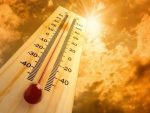
How language can turn down the temperature of heated climate change discourse
PTI, Aug 11, 2023, 11:15 AM IST

Representative image (Source: Pixabay)
The world is burning.
Death Valley, Calif., shattered the record in July 2023 for the hottest temperature on earth. Meanwhile, July 2023 is now the hottest month in recorded history and scientists have noted heat waves are 1,000 times more likely with climate change.
The effects of this heating are myriad and inter-connected. However, one underappreciated impact of global heating is its influence on language itself. Language evolves and adapts to environmental pressures in a delicate balance with its surroundings, just like any other ecological system.
This matters, as understanding the complex and evolving inter-connections between ecology and language, what we call “discursive ecology,” may provide key insights into how to better articulate effective climate responses.
The web of language
Most people in North America can feel the effects of the world getting hotter due to climate change. While most understand the nature of rising temperatures and ever more present wildfires, fewer people have effective language to talk about the realities and fears of climate change with their friends and families.
The impact of this is that citizens are without the developed layered languages, or the metalanguages, required to talk about the ecological issues surrounding us.
One of the challenges of climate change is representing the scale and magnitude of it in an easily understandable way, especially when it comes to how it affects humans and non-humans alike.
We wanted to find a metalanguage to explain this phenomenon.
Some of the research and education we have been engaged in at the University of British Columbia, both as sustainability fellows and in the Systems Beings Lab, examines what we are calling discursive ecologies — or the correspondence of language and ecological systems.
Put simply, both language and ecology are self-regulatory feedback systems that can respond and feed back into their environments. The act of creating meaning relies on interactive systems and influences how we share language across public discourses, cultural representations (TV, podcasts, social media etc.), and scientific communication. This creates balance in an ever-changing world.
This discourse ecology comprises, in the broadest sense, the complex communications of all living (and perhaps even non-living) beings.
Creating worlds
Words matter as they create meaning in our shared worlds.
Drawing on the philosophers Ludwig Wittgenstein and Abraham Joshua Heschel, however, allows us to see that words do not just create meaning, they create entire worlds.
This is why storytelling plays such a huge role in human development. The language of stories, as illustrated in the book Rewriting Our Stories: Education, Empowerment, and Well-being, can both heal and alter our reality through the networks of meaning and language.
Stories are the lifeblood of discursive ecologies. Imagine how trees or fungal networks speak — sensing, learning, and making decisions through chemical signals and electrical impulses.
Stories co-create worlds, much like fungal or human networks, drawing on living languages in various cultural or social systems. Similar comparisons can be made with terms like “heat” and “warming,” both of which produce various stories that are associated with systems of thought or understanding and corresponding actions.
Simply put, discursive ecologies allow us to see stories involving multiple people, cultures and languages as interconnected systems connected to their environments — and also allow us to grasp the impact of language upon human discourse.
The power of discourse
How people think, act and communicate about rising temperatures influences social progress. And yet, polarization has become commonplace in social and political discourse. This is particularly true around the term climate change.
By understanding the discursive metalanguages — or the systems of languages and meaning that connect humans and non-humans — citizens can re-imagine the divisive block of social discourse.
Instead of using terms such as “climate crisis” or “climate emergency,” people of the world might consider the context in which we now find ourselves: in an age of mass extinction. Such a shift in language invites collective action towards the mass extinction of wildlife instead of reducing individual human actions to fear responses.
What if we, as engaged citizens, refocused the emphasis from the deficit language of “emergency” or “urgency” or even “heat” and to the fundamental issue: human-caused actions are affecting many species and living systems at record rates, including human species? The term mass extinction already elicits urgency, but also invites collective engagement, instead of zero-sum words intended to generate emotion over action.
Language as an ecology to live by
Language in use, as we have referred to as discourse, is maintained through delicate balance. The greater the diversity of language, the more robust and culturally productive it becomes. This is also true of ecosystems.
Change itself is a part of every system. It is the basis of survival-adaptation. However, change is occurring at an unprecedented scale and speed. If we treat language and ecology as disconnected, our efforts will fall short of sustainable futures.
Language, and communication as a whole, is the richest resource we have in the effort to stabilize the future. But it is a frequently wasted and inappropriately used resource. Embracing and supporting diverse discourses assists the effort to adapt human behaviour to impede catastrophic events and gives us humans a chance to turn down the temperature of the heating world.
By Derek Gladwin, Associate Professor, Department of Language and Literacy Education, University of British Columbia, and Kedrick James, Professor of Teaching, Department of Language and Literacy Education, University of British Columbia (The Conversation)
Udayavani is now on Telegram. Click here to join our channel and stay updated with the latest news.
Top News
Related Articles More

China trying to undermine Tibet’s identity, want to make world aware about it: Tibetan girl who was jailed for protesting

Don’t blame Dubai’s freak rain on cloud seeding

What role does genetics play in breast cancer? How can genetic testing help with early breast cancer diagnosis?

From Orbit to Earth: ISRO’s Contributions to Understanding Himalayan Glacial Shifts

Modi Supports Philippines with BrahMos Missiles in China Sea Dispute
MUST WATCH
Latest Additions

Repolling held peacefully at one polling booth in Chamarajanagar LS segment in Karnataka

Court convicts four accused, acquits 10 in 2015 Malvani hooch tragedy

ICG apprehends Indian fishing boat with 173 kg of narcotics; two crew members detained

Ahead of phase 3 polls, Congress and BJP spar in MP over quotas, Muslim appeasement

Ramanagara: Five students swept away by currents in Cauvery river

























